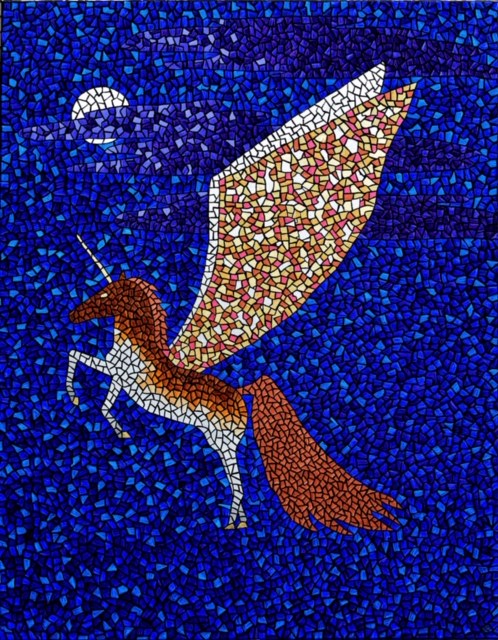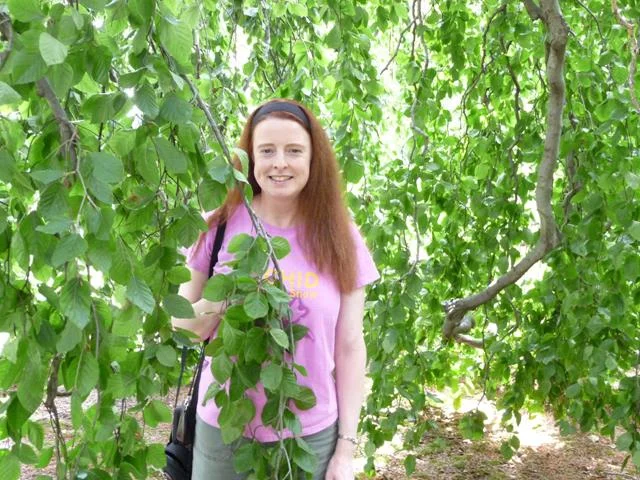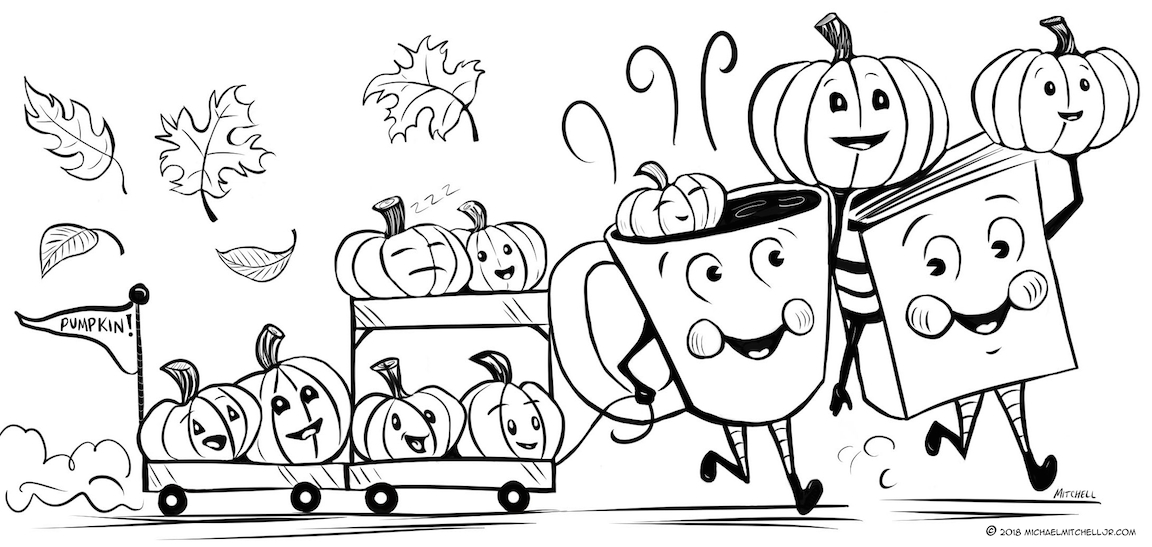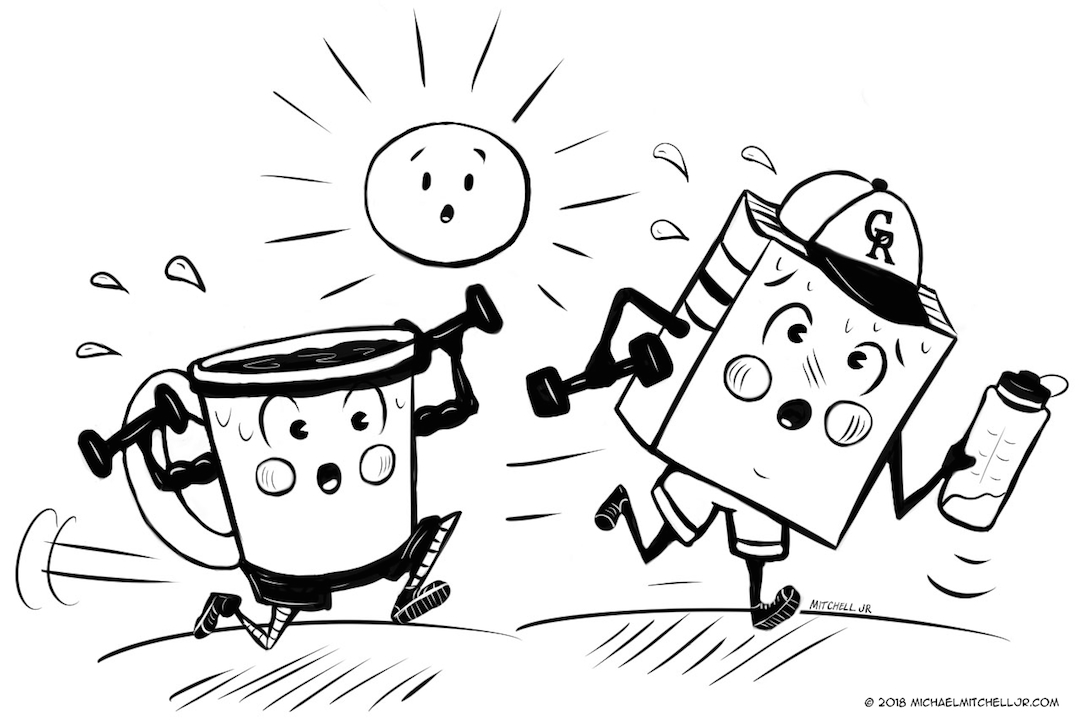Hi, I’m Michael, and welcome to Let’s Talk Process, Issue No. 5! Thanks so much for joining me for the fifth issue of my ongoing artist interview series. You can read more about me here.
My goal for this series is to dig deeper and explore how various creative people specifically approach their daily work. With that in mind, the questions for Let’s Talk Process center around the unique creative processes of artists & authors, how and when they work, routines, and inspirations.
This issue, I’m excited to have artist and graphic designer Katie Fletcher as my guest!
Hi Katie! To start, tell us a little about yourself and your art.
I'm a nerd and an outdoors enthusiast who loves history and data. A strong curiosity drive leads me to follow a lot of rabbit trails with the grand intention of getting somewhere, but with a really relaxed attitude.
I primarily work in digital formats, but I stray into other media to give myself a break. I dabbled in creating art through high school but didn't really buckle down until my sophomore year of college, when I changed my major to digital art. I now work as a metadata tech for digital projects at a library, but that's really just fed my passion for exploring unique digital media and data sets in my art even more. My work is informed by whatever I’ve been looking at most recently - right now it’s planes, glaciers, and big data sets. I like to look at how disparate elements can connect—images, data, algorithms—and create visual representations out of these ideas.
Describe your creative schedule. When do you work on art? What does your normal daily routine look like?
My creative schedule right now is very “fit it in when you can't stand sitting on the idea anymore.” With a full-time job, long commute, and a couple of big volunteer projects going on, finding time to work on art can be tough. One of the things I’ve learned to do is to take inspiration from other parts of my life and recycle what I can. I volunteer doing exhibit design and graphics for a World War II aviation museum, so I end up with a lot of photographs and graphics that are in the public domain. Some of the prep work for those graphics lends itself well to recycling into fabric patterns, so I take these, rearrange them, and produce something in a new form.
My daily routine looks something like this: Monday-Thursday: quick graphics processing on the bus to work. Maybe some work in the evening. Friday-Sunday: wake up, grab a cup of coffee, and then up to the studio to start. For longer work days, I try to manage my schedule so I work in 1.5 or 2-hour blocks with a break in between to get up and stretch, go to the gym, or take the dog out. If I'm working on the computer all day, I'll head to a coffee shop first thing in the morning for my most productive period to really buckle down and concentrate. I also try to take a weekend every so often completely away from projects and the studio to refresh my perspective.
Do you think there are certain times of day that are more conducive to your creativity?
Oh goodness yes. Evenings after work can be a slog. My best time to work is early in the morning, when I can set my brain into “art mode” and just crank for a good portion of the day. I’ll get up at an ungodly hour on a Saturday if it means I can have a few hours to concentrate before everyone else gets up. If I haven’t had an intense day at work, evenings can be productive, but they’re not the greatest.
How much planning goes into your creative process? Do you set self-imposed goals or deadlines along the way?
Having a friend help me keep track of goals and timelines has been invaluable. Just having to say “no, I didn’t hit that goal like I wanted to” to someone who is cheering for you for the second month in a row really makes you reexamine your priorities. Conversely, if you do nail the goal, having that person to celebrate with you is incredibly motivating. It’s taken me years to learn how I work. There’s a part of me that always has the next project in mind, so as soon as I think of something, I write it down. I have a Google Doc I can access from anywhere (phone, work, home) that I edit constantly, as well as my mini sketchbooks. I realize that about 90% of the projects will probably never materialize for one reason or another, but I’ve found that having a dedicated “brain dump” location really helps me focus on the project I'm currently working on, because I don’t have to worry about remembering details for the thing I’m maybe even more excited to work on next. It’s the Henry Jones method: “I wrote it down so I wouldn't have to remember!”
I try to set deadlines but don't always meet them fully. But setting a deadline does remind me of the time that’s passing, and it really motivates me to get the project done instead of putting it on the back burner for lack of “inspiration.”
There’s a lot to be said about just forcing yourself to sit down and work it out. I found that I’ve become a better and more productive artist if I have to consciously make a decision about something rather than relying on a whim of creativity to come. It’s good to have some practice at this for when short submission deadlines come up.
Do you have any particular rituals, locations, and/or favorite tools that are necessary for your creative process?
Using a record player for music is something I’ve singled out as important for concentration. I’m very anal about ensuring the record plays through, so none of the grooves get messed up in the middle of the record if I accidentally scrape it by lifting the needle. It forces me to leave my music alone and not worry about skipping through to songs I like, which is very distracting. It also forces me to get out of my chair for a mini break to flip the disc over. I’ve also made a couple of longer playlists on Spotify that are typically full of B-sides or recommendations from other people—stuff I don’t know super well. Putting these on shuffle with no intention of touching the skip button helps me focus. A local coffee shop is my favorite place to go to mix things up.
Favorite tools? Macbook with a lot of processing power and a series of 5x8" sketchbooks I can haul around to sketch out ideas or notes.
When you have a creative block or lull in your process, what are some things that help you get back on track?
My favorite barista’s name is Crystal, and she makes the best lattes. In all seriousness though, relocating my workspace is the best remedy. Getting outside for fresh air, or some form of athletic activity to get the body reengaged is huge. I dislike running, but if I’m really that stuck, I'll go for a run just to clear my head. I usually have a couple of projects going at once, so sometimes I’ll switch to one that is running on different software to get out of the rut.
Does social media help or hurt your creative process? In what ways?
A little bit of both. It can kill my creative drive if I’m engaging too much. On the flipside, it can also be very inspiring. I find that Twitter and Pinterest are valuable for finding people with common interests, as well as new techniques, tools, and resources. Facebook has greater potential to put me in a bad place emotionally, and I honestly haven’t explored much beyond that because I get too distracted. But on any of those platforms, I have to limit my time, and if I find myself going “oh! and I could do this and this and this...”, I know I have to get off of there right now, otherwise I’ll go on inspiration overload and never actually do anything. Connecting with the right group of people on social media can be very encouraging. It’s good to know you’re not alone in your struggles, and you get to celebrate other people’s victories.
When is a piece of art “finished”? How do you know?
It’s finished when I have accomplished the goals I set for that piece of art or design. I learned a long time ago that perfection is a stupid goal. Getting “close enough” and starting a new project will make you prolific and help you refine all stages of your process.
If I’m designing fabric patterns, I’ll try to design a series instead of a single, and I won’t be afraid to revisit the first one if I found a better way to do the third. In setting goals for a fine art print, I usually have a decent feel going in as to what I might want to accomplish with a piece based on my own reaction to the elements I’ve collected for it. These are more of an exploratory process, and not a production line. Setting a deadline for these to be done encourages me to leave it alone after a certain point and move on. Leaving mental room to recognize happy accidents and accept them for what they’ve turned the piece into is critical, and it’s helpful to recognize that though tweaking can always happen, sometimes it’s best to just leave well enough alone.
A big thank you to Katie Fletcher for being a part of Let’s Talk Process!
You can find Katie and her art at:
Twitter: @jelliclekatart and @digitalkg
Instagram: @jelliclestudio
Spoonflower: https://www.spoonflower.com/profiles/jelliclestudio
If you enjoyed this interview, feel free to like & comment below and share the interview link on social media!




























